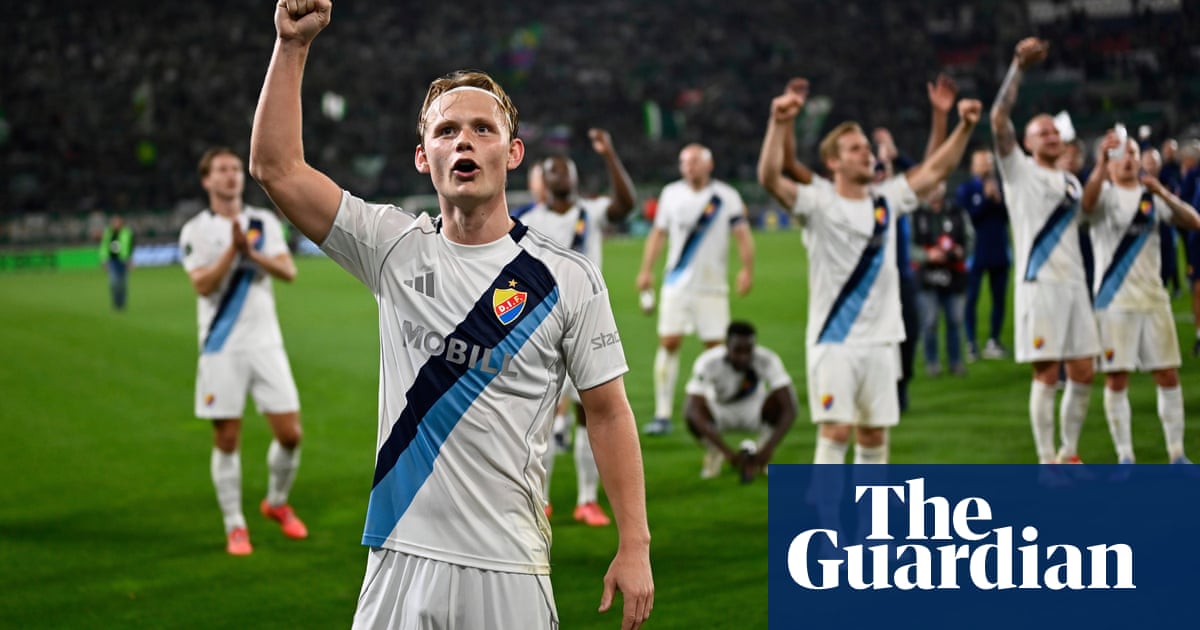Avisibly moved Bosse Andersson was trying to find the right words afterDjurgårdenhad beaten Rapid Vienna 4-1 away to reach the Conference League semi-finals. “I am just bloody proud,” the sporting director said in the end. “Real Betis, Fiorentina, Chelsea and … Djurgården in the semi-finals, that is unbelievable.”
He is not wrong.Chelsea, Real Betis and Fiorentina are European heavyweights while Djurgården have two Swedish Allsvenskan titles in the past 20 years. The Swedish side’s previous best in Europe came 70 years ago – in 1955-56 – when they reached the European Cup quarter-finals, having beaten the Polish side Gwardia Warsaw in the only previous round.
Djurgården’s whole squad is worth about £18m according to Transfermarkt. That is about one seventh of the value of Cole Palmer and the financial discrepancy between them and Chelsea,their semi-final opponents, sums up the Conference League in all its brilliance and folly. It has given some of the smaller sides on the continent a chance to go far in a European competition and has provided many clubs with invaluable income, but at the same time it is hard to ever see it being won by a side outside the top five leagues.
Not that the club known as DIF mind. They are likely to make more than £10m from this season’s competition and have taken their fans on a once-in-a-generation journey, starting on 25 July last year with a 3-0 second qualifying round first-leg win against Progrès Niederkorn from Luxembourg. A third qualifying round was navigated, as well as the playoffs, before the group stage started in October.
Here Djurgården, the club who sold Lucas Bergvall to Tottenham for £8.5m last summer, started to show they actually belonged. After one point in the opening two rounds – against LASK and Vitória de Guimarães–they won their four remaining games, including an eye-catching victory against Panathinaikos to finish in the top eight.
The first leg against Chelsea is in Stockholm on Thursday at a sold-out 3Arena and there is a real optimism in the squad. “I really believe we can go through,” the Japanese defender Keita Kosugi has said. The coach, Jani Honkavaara, has been cautiously optimistic in the buildup. “We need to be at our best and we need to be brave,” the Finn, who only joined in January, said on Wednesday. “Chelsea are really organised and patient in attack but they are not as patient in their defending. That is why we have to try to have the ball as much as possible, especially at home, and be effective in open play, be good with our set pieces, which is one way of hurting them.”
Honkavaara has not been helped by an injury crisis that has deprived him of several key players, including the attackers Oskar Fallenius and Nino Zugelj, who went off against Rapid and are not set to return until the summer. In addition two of his midfielders, Albin Ekdal and Matias Siltanen, were not registered for the Conference League squad and will not be able to face Chelsea.
It means Honkavaara only has 14 first-team players to choose from for the first leg and has been scouring the youth teams to find players for the bench. Uefa rules stipulate they have to be born after 1 January 2003 and need to have been at the club for at least three seasons. “I think Chelsea may have more midfielders than we have players,” he quipped on Wednesday.
This week the club has also had to deal with the resignation of its chairman after it transpired that he had shared xenophobic messages on social media. Lars-Erik Sjöberg apologised to “anyone who had been hurt” and said he hoped his “private engagement on social media would not have a negative impact on the club”. He has been replaced by Erik Gozzi.
Sign up toFootball Daily
Kick off your evenings with the Guardian's take on the world of football
after newsletter promotion
Chelsea are overwhelming favourites but Djurgården have players who can unsettle them. Kosugi is one of them, the 19-year-old full-back having been a revelation since joining from Shonan Bellmare in March 2024. A tireless player with outstanding technique, he was superb against Rapid and scored a beautiful goal in the second leg.
The Norwegian attacking midfielder Tobias Gulliksen is another threat. The 21-year-old has the capacity to unlock most defences and played a key role in the quarter-final. It was not quite Mario Götze against Argentina in 2014 –“show the world you are better than Messi”– but, before extra time against Rapid, Andersson told Gulliksen that “he had the x-factor and now was the time to show it”. The Norwegian scored two goals to complete the win.
Djurgården will need more of that – and some – against Chelsea. The fact that Gulliksen was not even a starter at Bodø/Glimt when he joined DIF last year, but is now their best player, is telling. The gulf in class between Djurgården and Chelsea is huge but that does not mean the Swedes are beaten before the tie has started. “We can’t focus on how much their squad is worth,” Honkavaara said. “We just have to go out and enjoy it.”
